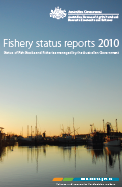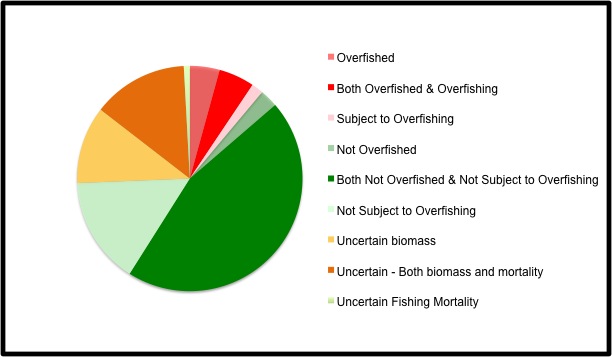
At the end of October the Australian Bureau of Agricultural and Resource Economics and Sciences (ABARES) released their Fishery Status Reports 2010, the annual assessment of the status of fish stocks and fisheries managed by the Australian Government. The document is used to assess the state of commonwealth fisheries and highlight emerging issues that may affect the fishing industry, fisheries management and the broader community. Government fisheries policies and fishery management plans are based on the information it provides.
The report assessed 65 fisheries solely managed by the Australian Fisheries Management Authority and 31 stocks jointly managed by the Australian government and other jurisdictions (including state fisheries and international agreements). These fisheries account for approximately 15% of the gross value of all Australian fishery production.
The report assesses individual stocks based on both biomass and fishing mortality using a traffic-light system. Here’s a snapshot of what they found.
Fisheries
96 fisheries were assessed in the report.
- 56 stocks were classified as not overfished (based on stock biomass) and 71 as not subject to overfishing (continued fishing pressure likely to reduce biomass to an overfished state); of these, 53 stocks were classified as both not overfished and not subject to overfishing
- 13 stocks in total were classified as either “overfished” or subject to “overfishing”; of these, 11 stocks were classified as overfished and 8 stocks were classified as subject to overfishing. 6 stocks were both overfished and subject to overfishing
- 29 stocks were classified as uncertain with respect to their biomass status and 17 as uncertain with respect to fishing mortality status; of these 16 stocks were classified as uncertain in regard to both biomass and fishing mortality
Status of Commonwealth Managed Fisheries – ABARE 2010

Species
Four stocks managed solely by the AFMA were classified as both overfished and subject to overfishing:
- Blue Warehou
- Eastern Gemfish
- Upper-slope gulper sharks (dogfishes)
- School Sharks
Orange Roughy remains classified as overfished as stocks still haven’t recovered from fishing in the 80’s and 90’s. However, closure of Orange Roughy fishing grounds means they are no longer classified as “Overfished”.
In the jointly managed fisheries, two stocks were classified as both overfished and subject to overfishing – Southern Bluefin Tuna in the Southern Bluefin Tuna Fishery and Toothfish (two species) in the Antarctic Waters fishery.
The report comments that; “The spawning stock biomass of southern bluefin tuna is at a very low level (~5 per cent unfished levels) and in 2010 the species was listed as conservation dependent under the EPBC Act. Given the results of the most recent stock assessment, Southern Bluefin Tuna remains classified as overfished and subject to overfishing.”
Looking Forward
Despite repeated assurance by both government and industry of the sustainability of Australian fisheries, the report reveals that; “…There has been substantial progress in commonwealth fisheries in this area. However, in some fisheries, challenges remain, particularly in terms of understanding and managing bycatch and interactions with protected species.”
The report continues’ “the short- to medium-term outlook for the biological and economic status of commonwealth fisheries is generally positive and is expected to continue, or possibly improve, into the future.”
“The positive status of the majority of stocks (not overfished and not subject to overfishing) suggests a strong outlook for the biological sustainability of these resources… despite this positive outlook, some challenges need to be addressed. These include the need to reduce the fishing mortality on overfished stocks to allow rebuilding.”
The Australian Marine Conservation Society (AMCS) responded to the release of the report by issuing a media release in which they expressed concern about the number of fisheries still listed as either overfished or subject to overfishing. “We routinely hear that Australia’s fisheries management is the best in the world,” said Darren Kindleysides, Director of the AMCS. “The science tells a different story. Thirteen commonwealth fisheries are still in real trouble.”
They did, however, commend increased certainty of the figures in this years report; “We’re pleased to see the total number of overfished Commonwealth fisheries edging down. There is also now less uncertainty around stock levels with fewer Commonwealth fisheries catching fish without knowing what the health of the targeted fish stocks is,” said Kindleysides.
GoodFishBadFish expects that some of the AMCS ratings in their popular “Australia’s Sustainable Seafood Guide” will be adjusted as a result of the newly released report.
More Information
Download the ABARE Report in full.
The AMCS media release on the report.
